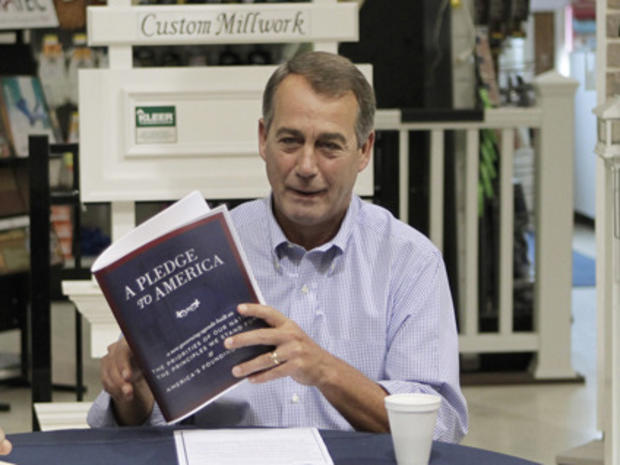Pledge to America: Are Social Conservatives Losing Their Voice in the GOP?
Toward the end of the introduction to the "Pledge to America," formally unveiled by House Republicans today, is this line: "We pledge to honor families, traditional marriage, life, and the private and faith-based organizations that form the core of our American values."
The document goes on to devote a small section to opposing using tax dollars to pay for abortion, an issue tied in large part to the health care overhaul legislation. But beyond that, there is almost nothing in the document - which comes in at 48 pages in its final version - that focuses on social issues.
Indeed, the Pledge is overwhelmingly focused on fiscal, national security and small government issues - chief among them cutting spending, repealing and replacing the health care bill, and lowering taxes. That fits with the priorities of the Libertarian-leaning Tea Party movement, which is largely (though not completely) pushing a vision for the country grounded in fiscal, not social, conservatism.
According to Politico, Republican Conference Chairman Mike Pence fought behind closed doors to get something on social issues included in the document; some Republicans thought it should stay away from such issues altogether. An effort to add something into the Pledge along the lines of the Defense of Marriage Act reportedly failed.
The language on social issues was enough for Dr. Robert George, founder of the American Principles Project, who said in a statement that his group is "pleased that the Republican leadership saw the wisdom of honoring our demand for a clear statement of commitment to life, marriage, and the free and full participation of religious believers and faith-based institutions in our public life."
In light of the relatively little attention social issues get in the Pledge, however, that seems like a pretty optimistic take. Social issues were a major part of the Republican platform during the Bush administration, particularly gay marriage: President Bush backed a constitutional amendment to ban gay marriage, and anti-gay marriage ballot initiatives were used to help get voters out to the polls.
This year, by contrast, such ballot initiatives appear to be nonexistent, and Republican rhetoric has rarely touched on homosexuality. (In the 48-page Pledge, the word "gay" never appears.) That can be attributed in large part to changing perceptions: Americans, particularly younger ones, have become more accepting of homosexuality, and most Republicans have little incentive to spotlight an issue that could divide potential voters. (One exception is the recent Senate vote on repealing the "don't ask, don't tell" policy on gays serving openly in the military, which showed that the issue still has at least some juice.)
Abortion is a somewhat different story: American views on that front have remained remarkably steady over the years. Yet the issue - one of the central sticking points in the so-called "culture war" - has largely faded from the public discourse, displaced by battles over the size of government and fiscal policy.
Social conservatives have tried to pull the GOP back in their direction: When potential GOP presidential candidate Mitch Daniels called for a "truce" on social issues, Mike Huckabee led an outpouring of social conservative anger, and Rick Santorum and some other prominent Republicans have also been pushing the GOP to refocus on such matters.
Sen. Jim DeMint, who has emerged as a Tea Party icon, tried to offer something of a unifying theory at the Values Voter Summit last week, tying Tea Party concerns to social conservatism.
"When you have a big government, you're going to have a little God," he said. "You're going to have fewer values and morals, and you're going to have a culture that has to be controlled by the government. But when you have a big God, you're going to have a responsible and capable people with character to control themselves and lead their own lives."
In fact, many of the leaders of the Tea Party movement - DeMint, Pence, Sarah Palin, Michele Bachmann and Christine O'Donnell among them - are social conservatives. But their rhetoric suggests that, for the most part, they recognize that their supporters are energized by fiscal issues, not subjects like homosexuality and abortion. And the Pledge to America is another piece of evidence that -- at least for now -- social conservative concerns appear to have been relegated to the GOP's back burner.
"Pledge to America" Unveiled by Republicans (Full Text)
"Pledge to America": The New Republican Agenda
"Pledge to America" Gets Mixed Reviews from Conservatives
GOP Says "Pledge to America" Should be Enacted Now

